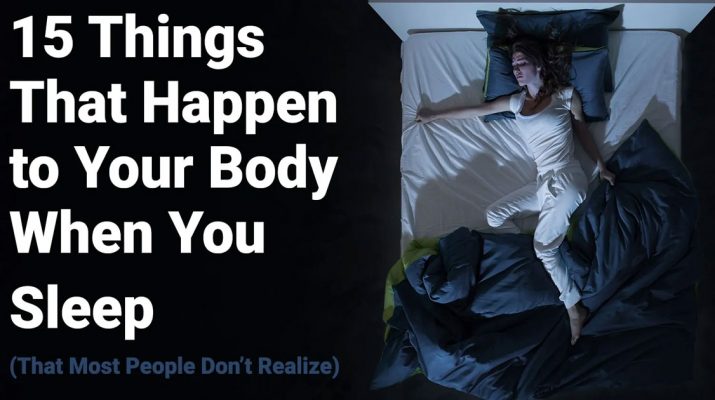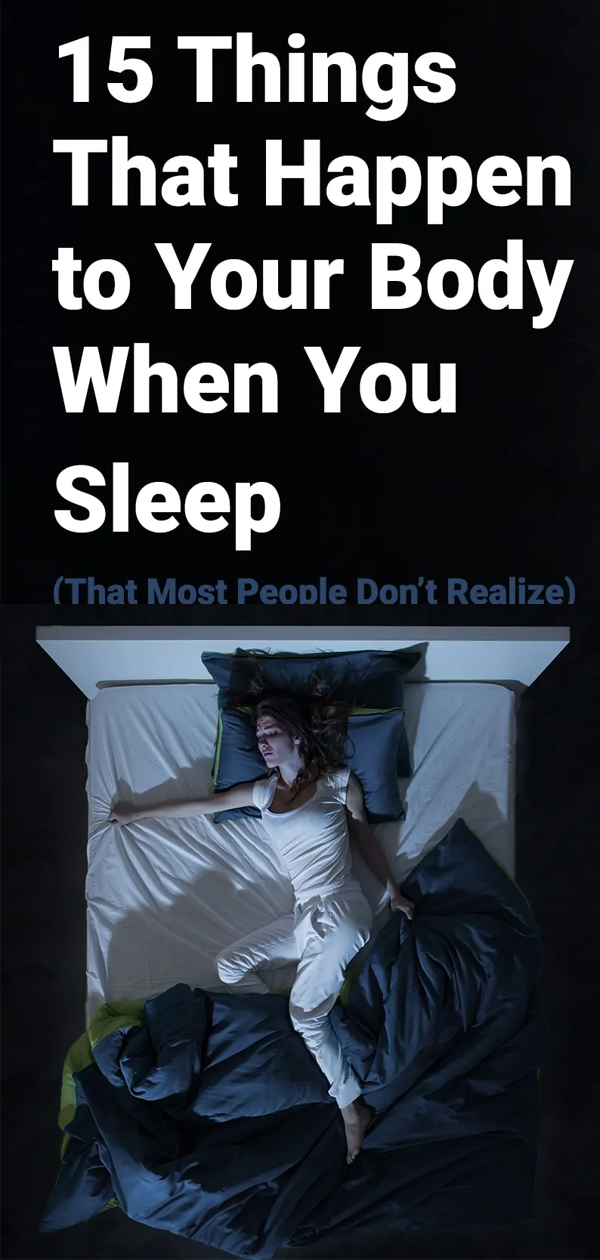Have you ever wondered why weird things happen when we sleep? Some of us talk and sleepwalk while we’re snoozing. In our dreams, we can fly, breathe underwater, and just about anything else you can think of. It’s not a stretch to imagine Lewis Carroll penning the masterful “Alice’s Adventures in Wonderland” after arising from a vivid dream (which we’ll also talk about.)
Sleep experts have a pretty good idea why many of these things happen. Unsurprisingly, much of what we experience while sleeping is a direct product of brain-body connection. Let us consider some of those things that happen to your body when you sleep – and why they occur.
15 Things That Happen To Your Body When You Sleep
-
You Start “Falling”
The sensation of falling is very common and is caused by a sudden muscle twitch or hypnic jerk. About 70 percent of people experience hypnic jerks, which occur during the first stage of sleep when the body begins to fall into a deep rest and the brain hasn’t “caught up.”
-
You Have Wacky Dreams
For all the crazy things that happen while sleeping, we only have two sleep modes: rapid eye movement (REM) and non-rapid eye movement (NREM). It is during REM when our brain fires neurons at a crazy rate. In fact, there is more brain activity during REM than when we are awake. This brain activity sometimes causes the intense dreams we experience from time to time.
-
You Start Babbling
Sleep talking happens when, for a brief moment, the normally-inactive mouth and vocal cords respond to a motor impulse in the brain. Chronic cases of sleep talking are rare and are considered a sleep disorder, though doing this occasionally is normal.
-
Your Kidneys Slow Down
Six-plus hours is a long time to go without tinkling. Like many other organs of the body, kidneys slow to hum while we get our shut-eye. The bladder becomes full, and we proceed to eject a seemingly endless amount of urine upon waking up.
-
You Form New Memories
During NREM, which comprises about 75 to 80 percent of our total sleep time, our brain absorbs and stores memories. It is during the NREM phase of sleep when the brain “transfers” short-term memories into long-term storage.
-
You Are Paralyzed
During REM sleep, the brain chemicals GABA and glycine combine to paralyze the skeletal muscles. Scientists posit that this chemical reaction within the brain is a survival mechanism, designed to keep us from acting out our dreams during sleep. When this neural system goes haywire, a person may suffer from sleep paralysis – a condition wherein the person is conscious yet unable to move.
-
You Pass Gas
Okay, so this one is no secret to any married person, but we fart when the body is at rest. All our muscles are relaxed when we slumber, including the, ahem, sphincter. Anyways, the good news is that, because your partner is also sleeping, they shouldn’t have to suffer … probably.
-
You Go Through Five “Stages” Of Sleep
There are five stages of sleep, each lasting between 90 to 110 minutes. The first stage involves a drift into and out of consciousness. The second stage is light, while the third and fourth stages involve deep sleep. During the fifth stage, our brain activity increases, and we enter REM.
-
Your Heart Slows
During NREM, our heart rate is both slow and steady. As NREM makes up most of the time when we sleep, this gives our heart a chance to rest and recharge. Our blood pressure and breathing also slow.
-
You Get Colder
While awake, our body goes through the process of thermoregulation – adjustment of internal body temperature due to the changes in the body or environment. This process isn’t as active when our body is at rest, probably to conserve energy.
-
You Get Your “Beauty Sleep.”
We’ve known for a long time that sleep induces processes linked to cellular growth and repair. This cellular healing extends to collagen within the skin. Collagen promotes skin health by enhancing its elasticity and firmness. Hence, the term “beauty sleep.”
-
You Do A “Brain Dump.”
How much useless information do we absorb on a given day? A lot, unfortunately. Per a study published in the journal Science, the brain gets rid of useless information by “cutting down” the synapses where the information is held. This “brain dump” allows us to learn new, important stuff – or re-learn useless junk (it’s really up to you what you choose to learn and store).
-
You Grow Up
If someone asks you, “When will you grow up?” You’re not snarky if you reply, “When I go to sleep.” See, your vertebra rehydrates during a long period of rest, when the body isn’t putting pressure on them by standing. So, you do, in fact, “grow up.” Okay, so maybe you’re being a bit snarky. What of it?!
-
You May Get Frisky
Yeah, apparently there is a condition called sexsomnia – and, apparently, it isn’t all that uncommon. In a study conducted by the researchers from the University Health Network in Toronto, eight percent of people surveyed at a sleep disorders center report getting frisky while dozing.
“Was it good for you?” (Okay, that’s enough.)
-
You May Have The Same Dreams Or Nightmares
If you have dreams that all revolve around the same theme – a phenomenon known as recurring dreams– you may be experiencing an unusual amount of stress. Recurring nightmares are more severe and are often triggered by anxiety, depression, and post-traumatic stress disorder (PTSD).


